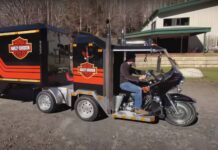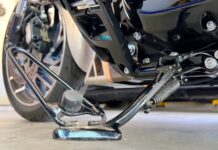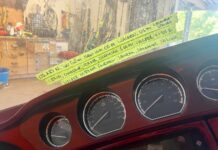Your Harley, like any other motorcycle, may someday go poof 60 miles from Phoenix. It may be well behaved and die just six miles from your dealer, or it is quite possible that it may toss a rod in the middle of Texas. For such an occasion, this writer, having been in the motorcycle repair business for awhile, has one or two suggestions to make.
Nine times out of 10, when your engine goes dead, the breakdown was caused by something so childish and insignificant that even a 10-year-old could effectively make the repair. Nine out of 10 failures can quickly be remedied once you know what caused them. Last thing touched, first thing wrong… you know the drill.
What to do till the doctor comes?
There are two ways to approach any mysterious failure, or perhaps I should say three. One way (and sometimes the most sensible) is to put a torch to the damn thing and collect on the insurance. (There are some very creative ways of doing this, but it’s a very serious offense if you get caught.)
The second (panicky) way to approach a roadside stall is to start pulling things out, or apart, and fucking with adjustments, until things are hopelessly out of whack, then compound the error(s) of each knee-jerk move by constantly cranking the starter to see if any of it magically worked. This will wear your battery down—reducing any spark energy—until it couldn’t possibly run even if it has fuel.
The third (and best) way to approach a failure on the highway, before even climbing out of the saddle, is to leisurely stretch yourself, take few deep breaths and perhaps mutter, “Well I’ll be a three-headed Laplander,” or something to that effect.
After this, light up a cigar or pipe, take a swig from an energy drink or just take three slow laps around the scooter till your pulse is back to something like normal. If you have a slight knowledge, or even an expert intimacy with engines, it is most important that you get yourself in the right frame of mind for solving the problem before you tackle it. Try to approach the failure like a disinterested kibitzer and your chances of success will be much better. Regardless of how urgent it is that you reach the next town quickly, don’t allow yourself to become panicked. You may be in the middle of the Alcan Highway, just 20 wheel-turns ahead of a raging blizzard, which will bury you in a few short hours, but I still say, take it easy.
Then, if you can resist using that cell phone for a bit, take a good look at the ol’ scoot. Lazily test for spark at the plugs. Observe all the wiring as if you couldn’t be less interested, because something “plain to see” like a coil wire or battery cable might have jumped out of place, snapped off or wiggled loose. It is also a good idea to check the fuel supply—ahem! If you have any, see if the gas is getting to the carburetor or injectors. Course, if you don’t have fuel to the engine but have it in the tank, the chances are the fuel filter/ petcock is clogged or the electric pump isn’t functioning; you may even have a loose wire at the pump.
If you haven’t any spark at the plugs, check for spark at the coil. If there’s none there, check “upstream.” Don’t be anal about it, ’cause late-model stuff is a bit too complex, but if there’s something simple and obvious, and you can “effect repairs” well enough to limp on to the next civilized spot—do it. If you are even remotely handy with tools it’s still not a bad idea to carry a selective set of these with you at all times. Even now, many’s the time elementary checks will reveal the source of the trouble, basic tools will mend it, and away you go! Bottom line is: If (or once) you have both of these essentials—spark and fuel—and you didn’t hear any expensive noises as you stopped, turn the key and start her up—she’s got to run.
More extensive (expensive) breakdowns such as collapsed pistons, busted belts, or a ruptured doohickey call for more thorough knowledge, correct tools, and replacement parts to overcome the trouble before you can start off again. That’s where the cell phone comes in!
It’s a wise precaution, when traveling long distances, to have a complete, nationwide list of competent service shops with you at all times. These are available at most dealers, and even if they aren’t franchises, many of the best are, in fact, independent shops.
Is there a doctor in the house?
As sad a commentary as it is, quality workmanship is no longer considered the premium it once was, by many shops. Top men, unfortunately, can no longer be found in every city or even in every state. In my 30-plus years of working on motorcycles and visiting service shops from coast to coast and across the ocean, I have yet to meet even a dozen men I would rate as “expert” in a specialty, let alone as a jack-of-all-trades “master” mechanic! In the past, I have worked in (and with) shops with plenty of talented mechanics who could overhaul and build engines to perfection—but then couldn’t make them go right because they didn’t have the “feel” a good tuner must have. Some could install cams in their sleep, but give ’em a clutch adjustment and they’re all thumbs. Astoundingly, good men in a particular specialty like this have even been fired just for giving the customer what he paid for. Partly, this is because a real good specialist might actually spend hours on a solution and will be losing money for the shop as well as for himself.
Traditionally, Harleys are considered relatively insensitive to correct adjustments, so a good tune-up (for instance) is considered less essential in this field than in the field of sportbikes and dirt racers. However, I have met men who were experts on getting the last rpm out of a Gixxer or CBR, then fell flat on their faces when tackling a Harley or Buell.
If you ever intend to repair or run a Harley over the long haul (in both senses), your most essential equipment will be good mechanics. Even if they charge you double rates, it’s still cheap, if they are the right men for the job. I use the term “mechanics” (rather than technicians) in the plural on purpose, by the way, because when it comes to proper care and feeding of Harley-Davidson motorcycles, I am 100 percent positive about one thing: There is no such thing in the entire world as a supreme all-around mechanic. (Feel lucky if the ones you deal with are simply good!) The fact is, with over 100 year’s worth of machinery to deal with, the human body doesn’t live long enough to become a real perfectionist in every field pertaining to V-twin technology.
For a man to become a perfectionist in engine work he must invest between 10 and 15 years of his life. Same goes for a tuner—as distinct from the former as a wheel, or carb, or electrical, or even an EFI guru is from the latter! Suspension men must also spend years at work and study; as must a transmission, brake, or any other “unit” specialist. A talented man who works on just carburetors and ignition can spend the better part of 10 years just learning how to get the most out of each of these systems. (If he is to be really good on several types of fuel delivery and ignition systems, he won’t be able to do it in 10 years.) A good wheel man has rebuilt hundreds of hoops, both spoked and cast, from the ground up. A good transmission builder alone must have six years under him. Driveline and clutch men, who really understand the nuances of transferring power from engine to tarmac, will have tried innumerable combinations and parts over years and years to arrive at what really works for what. I could yak on and on like this for hours, wasting a lot of good paper, but you understand the notion. Right?
A lot of the conversation and opinion so far has revolved around dedication and experience garnered over time. But there’s another element. Real talent is as easy to observe as it is hard to qualify, yet it’s out there. Whilst I’m clearly of the opinion that most true mechanics are made, not born, there’s no denying that plain old common sense, a certain gift for understanding underlying principles at a glance, and plain tech “smarts” can go a long way toward making a skilled mechanic out of men without a lot of experience. Put another way, if you find a man who can master a Rubik’s Cube in minutes and also claims to be a Harley mechanic, you just might be onto something. That said, these men will always be as scarce as hens’ teeth and worth their weight in gold, no matter how they come by their skills and abilities. If you happen to find a man who embodies all these qualities—the proverbial 25-year-old with 40 years of experience—you’ve just shot past the gold standard and stumbled onto pure platinum. Do not lose this fella’s contact info!
So—where’s the medicine, man?
Naturally, every shop claims it has a whiz, always ready and willing to service your newly acquired gem. The cold facts in the matter are that, in too many shops real mechanics are as rare as polar bears in the Mojave Desert. Unless the owners of the dealerships are mechanics themselves, there’s a risk they are so lacking in mechanical know-how they’d have a hard time differentiating between a bootblack and a grease monkey, let alone hiring real talent. For this reason—and the financial reality that talent costs too much money—when a fresh, smiling mechanic with six months of classroom training under him announces, “Bring your dresser in, Doc. Whatever’s wrong, we’ll find it and fix it, 100 percent,” slip that bagger in gear and head for the next shop to “shop around” for a little more tenable tale.
On the other hand, there’s safety in numbers. Most shops have several mechanics in their employ these days and you can rest assured that at least one or two of the bunch can handle your little problems. There’s also the nugget that “all of us is smarter than any of us” at play, which applies to shops where each man is conscientious about doing the best thing for the customer. As often as not, shared info and knowledge among colleagues means odds are good you and your scooter will benefit.
On this basis, it’s a bit harder in some ways for small shops to compete. Some are really only a one-man band, so that “band” better be skilled! The thing is, they usually are, or they wouldn’t be in a small shop. Tips to spotting talent under these circumstances are often down to things like reputation on the streets and length of time in business. If you scratch at the surface a bit, quite often you’ll find they have lots of previous experience in other shops or that they really do want to give you what you pay for, no matter what it takes. You also might be surprised how many successful independent mechanics come from a jack-of-all-trades background that couldn’t be tolerated as they grew into their respective specialty. In a very real sense, that’s the guiding light—specific mechanical skills—just as there’s a difference in medicine between a general practitioner and a specialist. Truly mysterious roadside maladies are few and far between, but in the event that you, or a “regular” mechanic can’t find—let alone fix—the problem, it might be time to call on an experienced specialist… wherever you can find one.
Good, bad or indifferent, such men are necessary in our world, and we thank them heartily here.



















